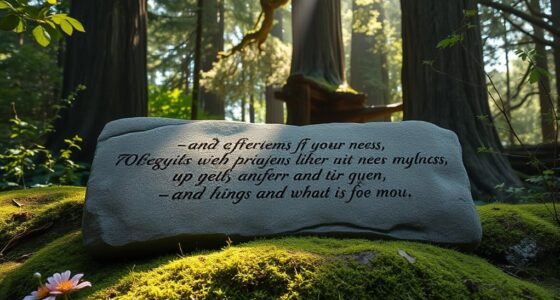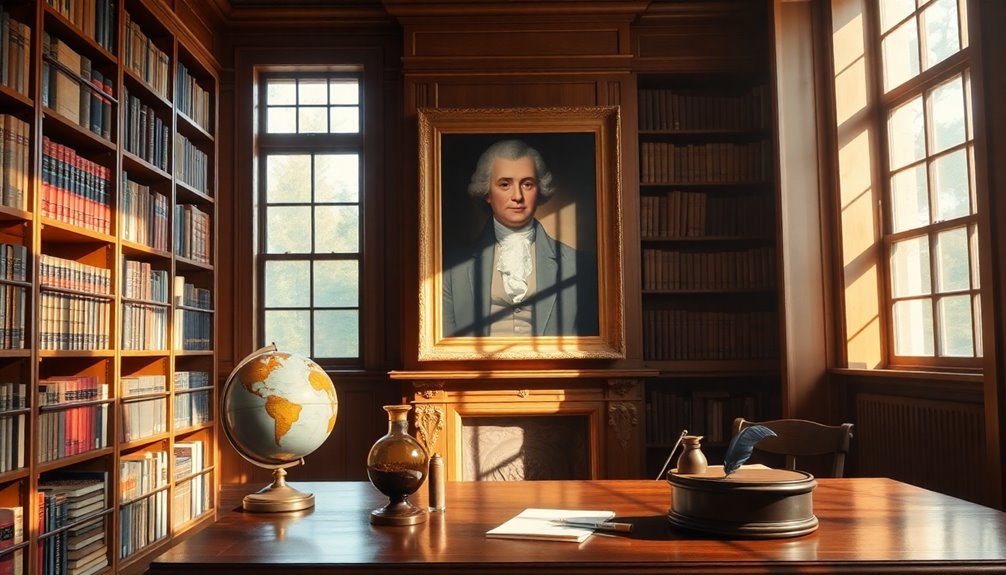Shakespeare’s one-liners still trend after 400 years because they capture universal truths and human emotions that remain relevant today. You see them used in movies, TV, and popular culture, adding depth and humor to stories. Their timeless themes about life, love, and doubt connect with audiences across generations. By understanding these lines, you’ll discover how Shakespeare’s words continue to inspire and resonate—if you keep exploring, there’s much more to uncover.
Key Takeaways
- His lines express universal truths and human emotions that remain relevant across eras.
- Modern media frequently references Shakespeare to add depth, humor, or gravitas.
- Adaptations embed his quotes, making them accessible and familiar to contemporary audiences.
- His words serve as cultural touchstones, fostering shared understanding and reflection.
- The adaptability of his language ensures his one-liners stay fresh and impactful over time.

Have you ever wondered why some of Shakespeare’s lines still resonate today? It’s because his words capture universal truths and human emotions that remain relevant, no matter the era. Over the centuries, playwrights, filmmakers, and writers have kept his one-liners alive, weaving them into modern adaptations and cultural references that feel fresh and impactful. When you see a character in a modern movie or TV show deliver a famous line like “To be, or not to be,” it’s not just a nod to classic literature; it’s a way to instantly connect the audience to timeless themes of existence, choice, and doubt. These lines transcend their original context, morphing into cultural shorthand that can express complex ideas succinctly. That’s why they continue to trend long after Shakespeare’s time—because they’ve become part of our collective language, embedded in everyday conversations, memes, and pop culture.
Modern adaptations have played a huge role in keeping Shakespeare’s one-liners relevant. Whether it’s a Broadway reboot, a blockbuster film, or a popular TV series, creators often incorporate these lines to add depth or humor. Think about how many modern movies quote or paraphrase Shakespeare to give their scenes a sense of gravitas or wit. These references serve as cultural touchstones, making the story more relatable and layered. When you hear a character say, “All the world’s a stage,” it’s not just a poetic line; it’s a way for writers to connect audiences with shared cultural references that evoke Shakespeare’s insights on life and society. This seamless integration keeps his words alive, sparking recognition and often prompting viewers to reflect on the themes behind them. Additionally, the enduring appeal of these one-liners is partly due to their adaptability across different media and contexts.
Frequently Asked Questions
How Do Shakespeare’S One-Liners Influence Modern Pop Culture?
You see how Shakespeare’s one-liners shape modern pop culture through their literary influence and cultural legacy. These memorable lines, like “To be or not to be,” inspire movies, memes, and everyday conversations. They connect you to timeless themes, making Shakespeare’s work relevant today. By echoing through media and language, these one-liners reinforce his impact, showing how literature can continue to influence culture long after its original context.
Are Shakespeare’S Quotes Still Relevant in Contemporary Society?
Sure, Shakespeare’s quotes still count in today’s world. You see, their cultural relevance endures because they echo universal truths and timeless themes. The historical context reveals Shakespeare’s skill in capturing human nature, making his words resonate centuries later. You can find his phrases in movies, memes, and speeches, proving that these lines are still relevant, reminding you of the enduring power of language and storytelling across generations.
Which Shakespeare Play Contains the Most Iconic One-Liners?
When you ask which Shakespeare play contains the most iconic one-liners, it’s often *Hamlet*. Through play analysis, you see how Hamlet’s introspective character quotes like “To be or not to be” resonate deeply. This play’s blend of tragedy and wit makes it a treasure trove of memorable lines. As you explore, you’ll find that *Hamlet* consistently stands out for its powerful character quotes that continue to influence today’s culture.
How Have Shakespeare’S One-Liners Been Adapted Into Movies?
Did you know that over 90% of Shakespeare’s one-liners appear in film references today? You’ve probably seen them in movies, where directors cleverly adapt these lines for humor or drama. These iconic quotes often turn into meme adaptations, making Shakespeare’s work more relatable. By weaving his one-liners into modern films, creators keep his language alive, engaging new audiences with timeless wit and memorable moments.
Can Shakespeare’S Language Be Understood by Today’s Audiences?
You might wonder if Shakespeare’s language remains accessible today. While some words and phrases aren’t immediately familiar, many are still understandable with a little context. Modern comprehension varies, but adaptations and annotations help bridge gaps. You can enjoy Shakespeare’s work by exploring modern translations or watching performances that emphasize clarity. Overall, with a bit of effort, you can grasp his timeless themes and language, making his plays still relevant and engaging today.
Conclusion
Imagine Shakespeare’s words as timeless seeds planted in a vast garden. Each one-liner blooms anew in different seasons, their roots deep in human nature. No matter how the world changes, these words continue to grow, intertwining with our lives like ancient trees offering shade and wisdom. Their enduring presence reminds you that great ideas, like sturdy oaks, stand the test of time, forever providing shelter and inspiration in the ever-shifting landscape of life.










